Former U.S. President Donald Trump’s recent “invitation” to Russian President Vladimir Putin to have his way militarily against NATO allies falling short of their burden-sharing goals was not only mean-spirited—it was downright dangerous. Not only for them but for us as well.
It is entirely possible that Putin could interpret Trump’s comments literally and, should Trump win reelection this fall, attempt an attack on an American ally next year. Perhaps he would test Norway’s northern border with a probing attack. Or he could fire missiles at Belgium or the Netherlands, two more countries that fall well short of the NATO minimum standard of spending 2 percent of GDP on their militaries—and thus qualifying for Trump’s wrath. Or in an echo of an earlier confrontation almost a decade ago, but this time with roles reversed, maybe he would authorize a shootdown of a Turkish aircraft patrolling near Russian airspace. Or maybe Putin would attack a neighboring Baltic state even though Estonia, Latvia, and Lithuania all do meet the 2 percent threshold, concluding that Trump’s contempt for NATO is so profound that he wouldn’t respond there either.
If any of these kinds of things were to happen, Trump would then face enormous pressure to defend the aggrieved ally. And he himself might conclude that Putin was no longer quite the friend he previously believed. If at that point the United States did respond directly to the attack, as the NATO Treaty’s Article V effectively requires under the alliance’s mutual-defense pledge, the United States with its allies could be at war against Russia. Just as Harry Truman might have thought the odds of war against North Korea were very low on June 24, 1950, but changed his mind immediately and dramatically after the North’s invasion of South Korea the next day (along with almost all the rest of the country), Trump could undergo an analogous change of heart once he stared naked Russian aggression in the face. He would have to worry that it might not stop where it started, when seeing opportunity due to an impetuous and irresolute American president.
In fact, Trump and others who feel like him might consider revisiting a short history of deterrence failure in American foreign policy. NATO has prevented attacks on U.S. allies for 75 years now. Before we had it, and in places of the world where we haven’t had such formal alliances backed up by ironclad American security guarantees, war has often resulted. And often, we have subsequently been dragged in, one way or another.
World War I occurred when the United States had a tiny military and no European allies. Germany thought it had an opportunity to defeat France (and the neighboring low countries) in the west, then swing its forces quickly to the east to fight with Austria-Hungary against Russia. Four years later, after America had remilitarized and entered the fray—and after 20 million total deaths on both sides—peace was finally restored. America changed its own position on the war once it eventually felt threatened itself.
And that peace would not last for long. The United States still had no alliances in Europe and only very miserly standing military forces throughout the 1920s and 1930s. That was not how Woodrow Wilson wanted it. He had plans for a strong security architecture to keep stability in Europe and the Far East. Alas, World War II resulted after the defeat of the League of Nations in the U.S. Senate in the 1920s again left an underprepared United States untethered to Eurasian security.
Finally, after 60 million died in World War II, we had learned the hard way not to leave Europe and Asia to their own devices, since it appeared we would inevitably be drawn into any major war that developed in the industrial heartlands of Western Europe or the Western Pacific region. So NATO and, soon, the U.S.-Japan alliances were created.
Alas, that didn’t quite do the trick because of what we left out of those early-Cold War alliance systems. The Korean War occurred after U.S. Secretary of State Dean Acheson, in a major speech, explicitly excluded the Korean Peninsula from the security perimeter that America would help defend against communism. Kim Il Sung then got the permission from Beijing and Moscow that had previously been denied him to launch the North Korean attack on South Korea which eventually led to American and Chinese intervention as well.
Fast forward to the next decade. Vietnam was not a member of the Southeast Asia Treaty Organization during its Cold War existence. There was no binding commitment of U.S. military power to South Vietnam’s defense—yet again, once a major war broke out there, we felt we had little choice but to intervene. That may have been a mistake. But it is the kind of thing that happens in American history; even if we try to avoid a war, when the stakes get high enough, we often change our collective minds.
Two more examples: The Iraqi invasion of Kuwait in 1990 happened after U.S. Ambassador to Iraq April Glaspie had earlier told Saddam Hussein that the United States had no position on inter-Arab border disputes. Osama bin Laden attacked us out of Afghanistan after going on the record with his view that the United States was a paper tiger militarily that wouldn’t trouble itself seriously with such a faraway place.
Then there is perhaps the most relevant case of all: Ukraine. Under President George W. Bush back in 2008, the United States joined the rest of NATO in promising Ukraine membership in the alliance … someday. Then Presidents Barack Obama, Trump, and Biden failed to make that happen. We left Ukraine in a strategic no man’s land. Put differently, we painted a bullseye on its back, since Russia saw it had an opportunity to attack—and perhaps prevent Ukraine from ever joining NATO—before membership could take effect. Whether one blames the original decision to offer membership or the failure to complete the process, it’s pretty clear that the net effect contributed to a failure of deterrence. Withdrawing Article V pledges from a current member of the alliance could produce a similar type of strategic limbo, with similar risks of deterrence failure—and war.
Trump is not just being unseemly and rhetorically belligerent. History shows he is playing with fire.
-
Acknowledgements and disclosures
The author would like to thank Alejandra Rocha for fact-checking assistance.
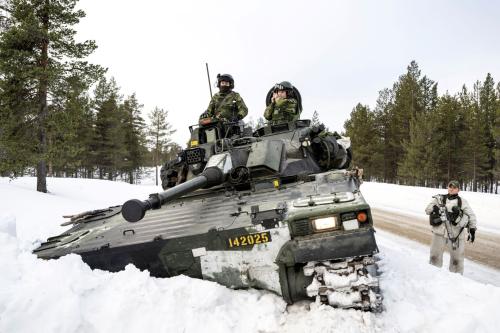
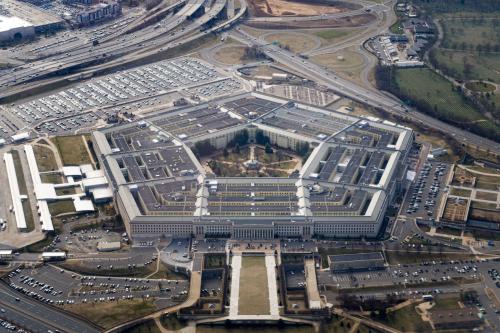
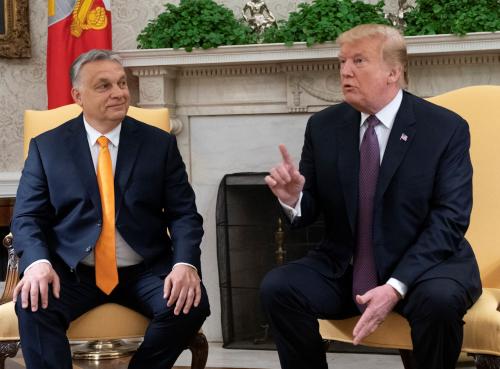

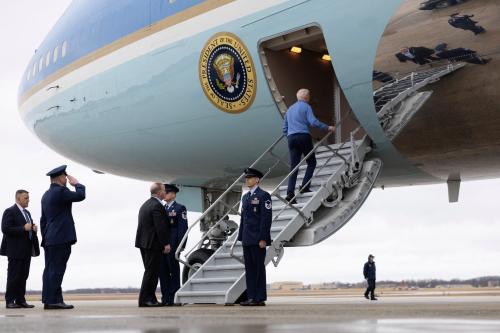
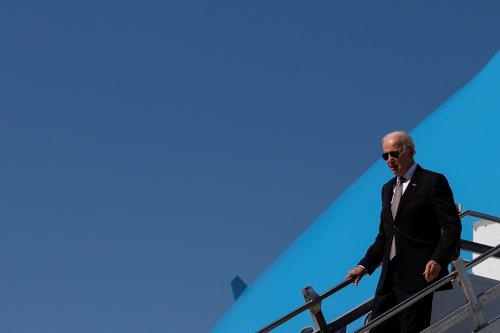
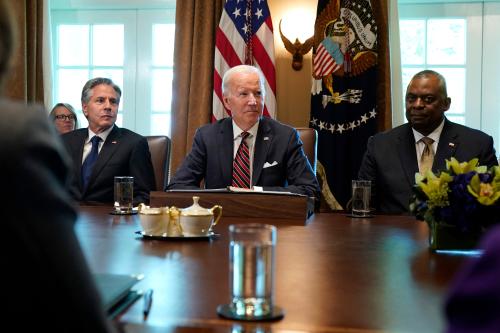

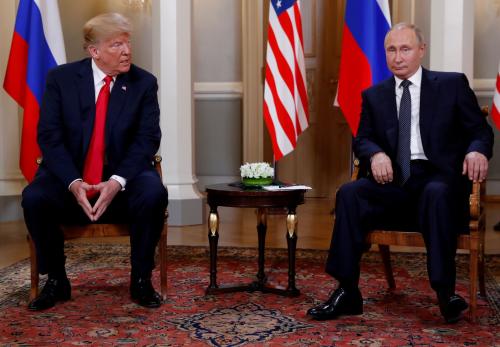
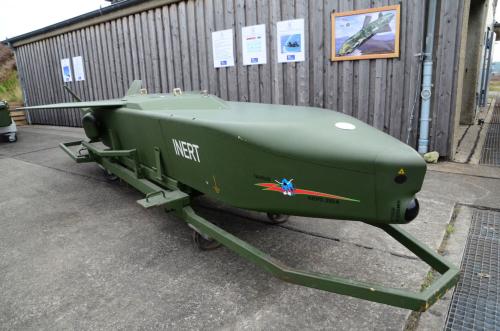
Commentary
Trump courts real danger with his invitation to attack NATO
February 15, 2024